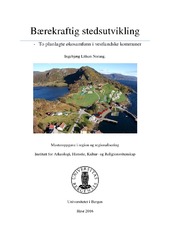| dc.contributor.author | Norang, Ingebjørg Lithun | |
| dc.date.accessioned | 2017-01-25T14:24:07Z | |
| dc.date.available | 2017-01-25T14:24:07Z | |
| dc.date.issued | 2016-11-22 | |
| dc.identifier.uri | https://hdl.handle.net/1956/15481 | |
| dc.description.abstract | This thesis is about sustainable place-development, focusing on two planned ecovillages in two municipalities in 'Vestlandet'; which in this thesis is seen as a cultural identity region on the west coast of Norway. Sustainable place-development is about environmental and social processes and measures that take account of present and future generations, and thereby also form the foundation of livable regions. Ecovillages are viewed as a models for sustainable place-development, and in this thesis I present the plans for the two ecovillages and the different places where they are to be established. The people that are involved in the establishment of the two ecovillages are represented by two groups: 1) The different developers of the two ecovillages: Bergen Økologiske Landsby and the project manager for Eide økogrend. 2.) The municipalities: Osterøy municipality and Hyllestad municipality. By using qualitative methods I examine in which way the place-attachment of the different groups function as a driving force in their efforts to develop sustainable places through the establishment of two ecovillages. The thesis hereby takes a closer look at how places and people are affected by each other in the process of sustainable place-development. | en_US |
| dc.description.abstract | Denne masteroppgaven er om bærekraftig stedsutvikling, med fokus på to planlagte økosamfunn i to kommuner på Vestlandet; som i denne besvarelsen forstås som en kulturell identitetsregion på vestkysten av Norge. Bærekraftig stedsutvikling handler om miljøvennlige og sosiale prosesser og tiltak som tar hensyn til nåværende og kommende generasjoner, og dermed også danner grunnlaget for livskraftige regioner. Økosamfunn ses på som modeller for bærekraftig stedsutvikling, og i denne avhandlingen presenteres planene for to økosamfunn og de ulike stedene hvor de skal etableres. Folkene som er involvert i arbeidet med å etablere de to økosamfunnene presenteres som to aktørgrupper: 1) De to ulike utbyggerne av økosamfunnene: Bergen Økologiske Landsby og prosjektlederen for Eide Økogrend. 2.) Kommunene: Osterøy kommune og Hyllestad kommune. Ved å benytte kvalitativ metode undersøkes på hvilken måte stedstilknytningen til de ulike aktørene har en funksjon som drivkraft, i arbeidet med å utvikle bærekraftige steder gjennom økosamfunnsprosjekt. Gjennom dette undersøkes hvordan steder og mennesker virker inn på hverandre i prosessen med å utvikle bærekraftige steder. | no_NO |
| dc.format.extent | 2606804 bytes | en_US |
| dc.language.iso | nob | eng |
| dc.publisher | Universitetet i Bergen (UiB) | eng |
| dc.subject | økosamfunn | eng |
| dc.subject | bærekraftig stedsutvikling | eng |
| dc.subject | stedstilknytning | eng |
| dc.title | Bærekraftig stedsutvikling - To planlagte økosamfunn i vestlandske kommuner | eng |
| dc.type | Master thesis | |
| dc.date.updated | 2017-01-25T14:20:33Z | |
| dc.rights.holder | Copyright the Author. All rights reserved | eng |
| dc.description.degree | Master i Region og regionalisering | |
| dc.description.localcode | MAHF-REG | |
| dc.description.localcode | REG350AHKR60 | |
| dc.subject.nus | 713999 | eng |
| fs.subjectcode | REG350AHKR60 | |
